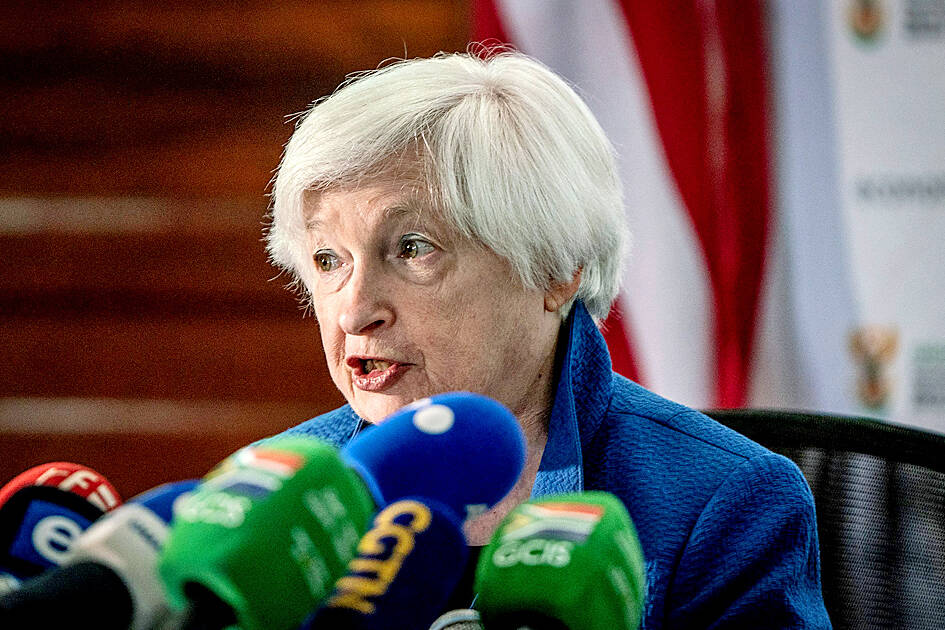US Secretary of the Treasury Janet Yellen said persistently weak inflation is likely to return as a long-term challenge for the economy and policymakers once COVID-19-era distortions behind the recent surge subside and prices cool.
“We’re just coming through an unusual and difficult period, but I do not think we’re in any way back to the ’80s and ’70s,” she said in an interview, referring to an era of rising prices and wages.
Yellen, along with US Federal Reserve Chairman Jerome Powell and many in the US economic establishment, incorrectly predicted in 2021 that the burst of inflation would be “transitory.”

Photo: AFP
She has since admitted getting that call wrong and supported the Fed’s efforts to rein in prices with aggressive interest rate hikes, which risk pushing the US into a recession.
Yellen said that unlike in the 1970s and early 1980s, this episode of high inflation has not triggered a wage-price spiral, a dynamic in which workers demand raises in anticipation of higher prices, prompting firms to increase prices.
Economists look for signs of such a spiral in inflation expectations.
“Expectations have been well-anchored, and I believe they’re still pretty well anchored,” she said in the interview in Johannesburg on Friday, on the final leg of a three-nation visit to Africa. “So we’re not seeing a wage-price spiral. That’s not happening.”
The annual increase in the consumer price index topped out at 9.1 percent in June last year, but slowed to 6.5 percent as of last month in response to the Fed’s rate hikes, as well as easing supply chain stresses and sliding oil prices.
Former US secretary of the Treasury Lawrence Summers and former IMF chief economist Kenneth Rogoff are among those who have warned the world’s economy is entering a period of geopolitical tensions and debt crises that risk making episodes of high inflation and high interest rates more common.
Former IMF chief economist Olivier Blanchard, is more aligned with Yellen, saying that today’s inflation should not last and that central banks, including the Fed, would face a return to an environment where interest rates are uncomfortably close to zero.
He has proposed that central banks lift their inflation targets from 2 percent to 3 percent to counter that.
“The pandemic created such unusual disruptions in the economy,” Yellen said. “There were just a lot of supply chain problems. We really hit the wall in a bunch of different sectors and prices really skyrocketed.”

To many, Tatu City on the outskirts of Nairobi looks like a success. The first city entirely built by a private company to be operational in east Africa, with about 25,000 people living and working there, it accounts for about two-thirds of all foreign investment in Kenya. Its low-tax status has attracted more than 100 businesses including Heineken, coffee brand Dormans, and the biggest call-center and cold-chain transport firms in the region. However, to some local politicians, Tatu City has looked more like a target for extortion. A parade of governors have demanded land worth millions of dollars in exchange

An Indonesian animated movie is smashing regional box office records and could be set for wider success as it prepares to open beyond the Southeast Asian archipelago’s silver screens. Jumbo — a film based on the adventures of main character, Don, a large orphaned Indonesian boy facing bullying at school — last month became the highest-grossing Southeast Asian animated film, raking in more than US$8 million. Released at the end of March to coincide with the Eid holidays after the Islamic fasting month of Ramadan, the movie has hit 8 million ticket sales, the third-highest in Indonesian cinema history, Film

Taiwan Semiconductor Manufacturing Co’s (TSMC, 台積電) revenue jumped 48 percent last month, underscoring how electronics firms scrambled to acquire essential components before global tariffs took effect. The main chipmaker for Apple Inc and Nvidia Corp reported monthly sales of NT$349.6 billion (US$11.6 billion). That compares with the average analysts’ estimate for a 38 percent rise in second-quarter revenue. US President Donald Trump’s trade war is prompting economists to retool GDP forecasts worldwide, casting doubt over the outlook for everything from iPhone demand to computing and datacenter construction. However, TSMC — a barometer for global tech spending given its central role in the

Alchip Technologies Ltd (世芯), an application-specific integrated circuit (ASIC) designer specializing in server chips, expects revenue to decline this year due to sagging demand for 5-nanometer artificial intelligence (AI) chips from a North America-based major customer, a company executive said yesterday. That would be the first contraction in revenue for Alchip as it has been enjoying strong revenue growth over the past few years, benefiting from cloud-service providers’ moves to reduce dependence on Nvidia Corp’s expensive AI chips by building their own AI accelerator by outsourcing chip design. The 5-nanometer chip was supposed to be a new growth engine as the lifecycle